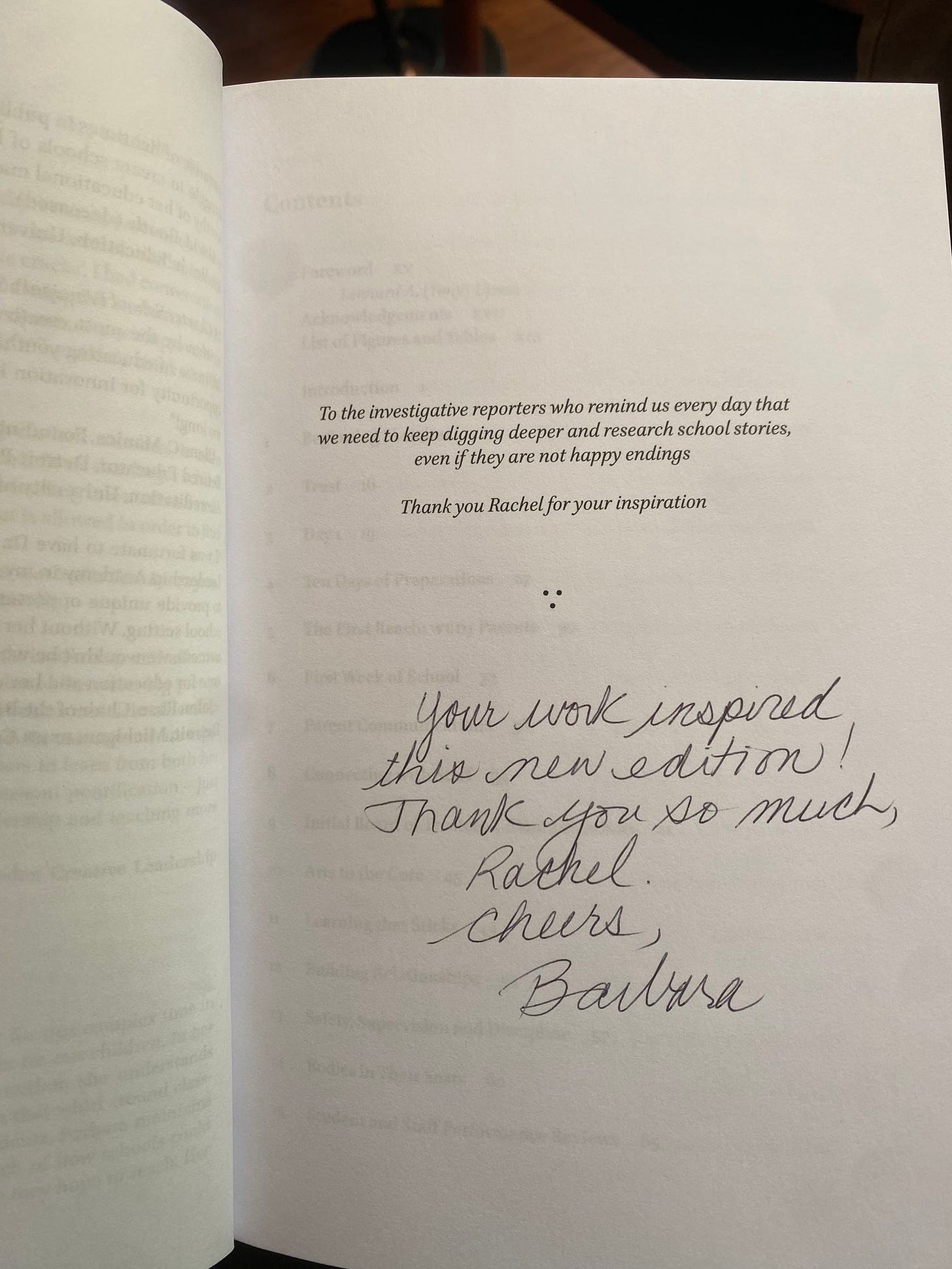Child care caps and cliffs
+ some thoughts on "astroturf" groups, a special book dedication, and pro-natalism questions
Hi everyone,
Happy June. It’s been a busy/good last few weeks — I’m excited about some projects in the works and to share more on those with you soon. Vox just celebrated its 10th anniversary, which is really exciting especially in an industry where things often feel pretty dire. They celebrated by launching a new redesigned website (that looks also much better on mobile!), a new membership program, and we published a package of stories highlighting some big, pivotal news moments of the last decade, and some predictions for the next decade to come.
(My contribution for the package was about the Red for Ed movement of striking K-12 teachers in 2018, and why I think that was an important turning point for labor + public education.)
I have three other new stories to share, and then I thought I’d offer some thoughts on a little heated thing I found myself involved in on the internet yesterday.
Oh also, this was really special:
In 2018, back when there was still a print edition of the paper :( I was very proud to publish this cover story investigation for Washington City Paper on a lucrative charter school consulting company called TenSquare.
A few weeks ago I received something in the mail from an educator I interviewed for that story. She had published a new edition of her own book, and with a new very meaningful dedication to me. (Thank you Barbara Smith!)
OK now on to stories:
1. The first new story is called The Child Care Cliff That Wasn’t and it’s about the widely-predicted child care industry collapse that never happened, and the fact that more moms are working today than any time on record.
I look at why these positive economic trends are happening (including child care employment levels exceeding pre-pandemic levels) and the costs of cataclysmic economic predictions that never materialize.
Jerusalem Demsas at The Atlantic published a really nice piece afterwards that explored some similar themes, in a piece titled The Maternal Mortality Crisis That Didn’t Happen. We’re very much on the same page about this. (She also launched a new policy podcast this week she’s hosting that I’m very excited about and you should give it a try, especially if you like the kinds of things you find in this newsletter around social science research.)
2. The second piece I published is titled Rent control for child care? and it looks at an idea that was pushed legislatively this year in Minnesota to essentially cap child care costs for middle and upper middle class parents, effectively providing more affluent parents with co-pays to limit their burden. It didn’t pass, but it was an off-cycle budget year and I definitely think we’ll be hearing more about this next year. Not everyone thinks it’s a good idea, since lower-income families are still struggling, and capping payments at 7 percent of a household’s income is still pretty confusing for a lot of people. But I think the piece gets at some interesting ideas and tensions circling around child care advocacy right now, and I’m definitely interested in watching those develop.
3.The final piece I published was called A new strategy to house the homeless. With the Supreme Court’s Grants Pass v. Johnson decision looming (expected later this month) we wanted to keep our focus on what some cities are doing to clear homeless tent encampments but then moving people into housing, not shelter or jail. I wrote about this company working with a few cities (Dallas, Oklahoma City, New Orleans, Hartford, CT) to do this work, and part of their model is essentially leveraging private-sector dollars to pay landlords more money to rent out to people experiencing homelessness. Is that a good idea? I talked with supporters and critics of the model, and how the work itself could change should the Supreme Court overturn Grants Pass.
I also want to shoutout to two readers who emailed me after these last two pieces came out with just really tremendous feedback + context that I wished I had had when writing. I will keep it in mind for future stories, and friendly reminder I always welcome your thoughts! Your questions, the things you think I missed or got wrong, etc.
I'm going to be doing more reporting on the emerging 'pro-natalism’ movement this year. (If you didn’t catch this viral story in The Guardian from a few weeks ago, I’d recommend making some time for it.)
I have a lot of questions about the people involved and their goals, and also want to hear your questions. If there are things you’ve been wondering about, or hope I can get some more clarity on — please let me know. (In the comments, or by email rachel.cohen@voxmedia.com or signal/text 202-681-6194)
Since this is my periodic newsletter that I use mostly to distribute work but occasionally to solicit help and flesh out thoughts or offer post-script ideas, I wanted to take a few minutes to talk about something that happened online yesterday that generated some confusion, among other things. I tweeted something, a few people got mad about it, I later deleted the tweet, which some people took to mean I “backed down” or changed my mind, (they were so proud of themselves!) when really I just deleted it because I was getting too many rude/distracting/gratuitous messages and didn’t feel like continuing that conversation on that platform anymore. I’ll give a quick recap now.
On Tuesday night Axios published a story saying the Sunrise Movement, a progressive climate group, was withholding an endorsement of Biden in 2024, largely because of what’s happening in Gaza.
Here’s what I had tweeted:
Some fans of Sunrise were mad about this. How dare I say that! Don’t I know what words mean?! I do, and I also recognize people bring quite different definitions to the same word so I’ll explain what I mean here. I haven’t been really been on the climate per se beat for the last two years, but I covered Sunrise a fair amount before joining Vox, sometimes just on their own organizing, and sometimes as part of stories I reported looking both at carbon-capture technology and the intersections between climate and labor. I also reported on them for a big story I did back in 2021 on dark money groups on the left. And then I’ve certainly followed climate reporting over the last few years since Build Back Better/ Inflation Reduction Act/ were basically the biggest policy fights of the Biden administration. (This is my plug for Heatmap News.) And what I have continued to cover at Vox, and what I did for years before Sunrise was even founded in 2018, is report on advocacy groups. So yes, let’s say my perspective here is shaped by covering K-12 education reform, by covering child care and voting rights and abortion rights and other 501c3/501c4 political organizations like the ACLU.
So anyway, here are some of the responses I got before I decided I was tired of doing this on Twitter (the last two will probably clarify that for you)
Yeah, so anyway, just to clear up confusion here, reflecting on tweets + emails I got:
Some people think it is only appropriate to use the word “astroturf” in the context of things like Russian bots posting on Facebook, or that it has to refer to a conservative/right wing organization. I definitely disagree on both counts.
Some people think its only astroturf if the funder is controlling the strategy like a marionette, which is again, not true in my view, including for Sunrise. If the foundations that prop it up played a bigger role in strategy, then I think we’d be more likely to see a Biden endorsement given Biden’s record on climate. I recommend taking a look at astroturf parent groups in other issue-areas for reference points. It’s not uncommon for astroturf groups to have volunteers who set strategy.
Some people apparently think if a group has real genuine climate-passionate volunteers they could not be considered an astroturf group. This is not true, what makes it astroturf in this context is that it massively exaggerates the number of young people it claims to represent and has the ability to mobilize, and uses astroturf organizing tactics funded by undisclosed donors to do so. This shouldn’t be controversial on the progressive left to say and it’s a little depressing to see such resistance to what feels pretty basic here. It also doesn’t mean Sunrise doesn’t have real genuine volunteers doing some cool local organizing.
Anyway my real takeaway from all this was that I get why Sunrise did not endorse Biden, because they are worried about alienating certain people + progressive allies they have over Gaza. This coalitional dynamic is not really that different from why they also fought pretty hard against carbon-capture tech despite what the climate scientists were saying about it. What grated me on Tuesday night, and still now, is that you have Sunrise leaders tweeting anti-Biden things, but then saying they should be immune for critique because they are still planning to send postcards + make calls for him in the fall. I think they're in denial about their role in shaping attitudes and media coverage towards Biden, while also overstating the role they play in turning out votes.
This is nuanced so I’m going to say it again differently. They are not power-less, but they are also not demonstrably powerful to me in the way they say they are. I think Sunrise has long dramatically inflated the # of people in its movement, and they do this the way that many dark money foundation-funded groups do it. They’re free to do whatever they want! But I do think Democrats in power should be a little more skeptical of the mass youth constituency Sunrise claims to represent, as well as claims they make about what youth voters generally think on climate issues.
Actually just to close the loop on this long newsletter, there’s a ton of overlap in the apocalyptic, scary, world-is-ending rhetoric in climate advocacy that we see in other issues (like maternal mortality, child care industry collapse.) Sometimes it is genuinely warranted, and sometimes it really does prevent us from talking about things clearly, including where things are getting better and changing.











Rachel, I'm sorry you were subjected to nasty personal attacks on social media. I know if anyone can handle it, you can, but it still sucks. Keep up the excellent and brave reporting (and focus on that nice book dedication)!
The childcare industry is such a fascinating phenomenon the more you look into it - I'm hoping it can get a sort of 'Uber' style shake up to help offset the enormous costs everyone it sinking into it. Great article!